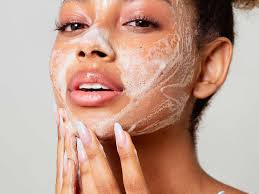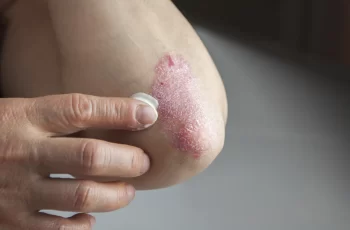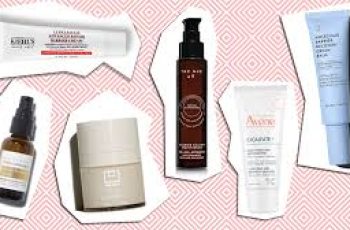I Still Have Blackheads—Does This Mean My Cleanser Isn’t Working?
You’ve got the perfect five-step skincare routine in place, an encyclopedic knowledge of which ingredients to use (and which to avoid), and you never go to bed with your makeup on. You’re doing everything right. And yet there they are, clear as day, staring back at you in the mirror: blackheads.
To be clear: There’s nothing wrong or shameful about having blackheads or other forms of acne. But when you’ve been fighting breakouts but don’t feel like you’re winning the battle, it’s natural to want to find out if there’s a weak spot in your arsenal—maybe like your cleansing products. We asked board-certified dermatologists Kseniya Kohets, MD, and Nazanin Saedi, MD, to break down everything from the causes of blackheads to how to tell if a cleanser is working and how to choose the best cleanser for your skin type. Read on to find out what they told us.
Meet the Experts
Kseniya Kobets, MD, MHS, FAAD, is a board-certified dermatologist at Montefiore Einstein Advanced Care in Westchester, NY.
Nazanin Saedi, MD, FAAD, is a board-certified dermatologist at Plymouth Meeting Dermatology in Philadelphia.
What causes blackheads?
In simple terms, blackheads are clogged pores. “Blackheads are pores filled with excess oil, keratin, and makeup that, when exposed to air, turn black due to oxidation,” says Corbetts. “Excess oil production clogs pores, leading to various forms of acne, including blackheads,” Saedi explains. “The black discoloration is not caused by dirt, but by a chemical reaction between the clogged oil and the air.”
Blackheads typically appear as small black dots on and around the nose, usually in the T-zone, but can also appear on the chest, back, or ears.
Here’s How to Tell If Your Cleanser Is Too Weak
If your current skincare routine isn’t effectively clearing up blackheads and acne, it may be time to rethink your ingredients and consistency. However, before you decide your cleanser is too gentle and resort to something harsher, remember that stronger products aren’t always the solution. Kobets tells us that while feeling “squeaky clean” after cleansing can be satisfying, over-cleansing can dry out the skin and damage its barrier and microbiome.
“A consistent skincare routine with anti-acne ingredients is the best way to get clear skin,” says Saedi. Opt for products with restorative ingredients like glycerin, ceramides, niacinamide, hyaluronic acid, peptides, and botanicals to soothe the skin and support a healthy microbiome.
What to look for in a cleansing product
According to Kobets, there are three key elements to consider when it comes to products that eliminate blackheads:
Formula: For oily skin, a foaming cleanser is ideal (although she advises caution with these formulas, as overuse can dry out the skin and damage the barrier and microbiome). Dry skin types may benefit from a hydrating cleanser.
Benzoyl peroxide: She recommends using benzoyl peroxide to remove excess oil, dirt, and makeup from oil glands. Be sure to use white towels in your skincare routine (this ingredient can bleach fabrics) and avoid expired products, as they can be irritants.
Consider salicylic acid: This is a top ingredient for preventing and treating blackheads. “This beta-hydroxy acid is lipophilic (fat-loving) and can penetrate deep into pores to remove oil,” she explains. “It also has anti-inflammatory properties that can improve skin tone and pigmentation.”
Kobets warns against using benzoyl peroxide and salicylic acid at the same time to avoid irritation. If you also use a topical retinoid, be careful not to mix it with other active ingredients.
Berdie Tips
First, incorporate benzoyl peroxide or salicylic acid into your routine a few times a week, especially if you have sensitive skin.
More Tips for Treating Blackheads
Use a retinoid: “Using a retinoid daily can help,” Kobets says. Plus, “it can often be combined with benzoyl peroxide or salicylic acid to reduce greasiness and pore size,” she adds.
Watch your moisturizer: Kobets also recommends cutting back on heavy moisturizers, especially those with dimethicone, as they can cause oil buildup and constipation.
Try a topical treatment: “Topical treatments for acne can also be helpful—just make sure to use them as directed,” she adds.
Consider light therapy: Another option is blue and red light therapy masks, which can help clear active acne and reduce redness and inflammation with regular use. “These masks are an expensive proposition, so only invest if you’re really committed,” Saedi advises.
Book an in-office treatment: Depending on the severity of your acne, you may also opt for in-office treatments, such as a hydrofacial, chemical peels, or laser treatments, to reduce oil production and improve skin texture.
Conclusion
It’s easy to over (or under) your skincare routine in an effort to remove blackheads. But it’s important not to lose sight of the goal: “The goal is to cleanse the skin and remove excess oil while maintaining the skin barrier,” Saedi advises. If blackheads persist despite your best efforts, she recommends consulting a dermatologist for a customized acne treatment plan. She also reminds us that acne is a normal skin condition, and treating it takes time and persistence. “Effective acne treatment requires patience,” she says. “But with proper care, you can keep them under control.”
DQH Can I use salicylic acid first and then vitamin C?
It’s easy to create a skincare routine, but knowing how to use it is another thing entirely. In most cases, if you’re not getting the desired skin results, it could be due to the layering of conflicting ingredients. So, is it possible that salicylic acid and vitamin C are such ingredients? Or are these active ingredients the duo that’s been missing from your skincare routine? If you want answers, stick around because today we are going to explain the benefits of salicylic acid and vitamin C and how they can be used in your daily life.
What are the benefits of salicylic acid for skin?
Salicylic acid is one of the most commonly used beta hydroxy acids and is favored by many people with oily, acne-prone skin. This acid is derived from willow bark, and unlike its water-soluble relatives (called alpha-hydroxy acids), salicylic acid is oil-soluble, which means it can penetrate deeper into the lower layers of the skin. Once it reaches the lower layers, it can help unclog pores of excess sebum, dirt, bacteria, debris, and impurities. This results in clearer skin tones and greater definition.
Not only does salicylic acid benefit the underlying layers, but the outer surface of the skin benefits as well. When applied to the skin, salicylic acid removes the buildup of dead skin cells. This is accomplished by breaking the bonds that hold dead cells to the surface. Over time, this can cause the complexion to look dull and prone to acne, blackheads, and other blemishes.
If you’d like to learn more about salicylic acid and how it can improve your skin, check out this dedicated blog post from a beauty insider.
What are the benefits of vitamin C for skin?
Vitamin C is considered one of the most powerful antioxidants, which means it is very effective at fighting free radicals and preventing them from causing further skin damage. Examples of free radicals include pollution, central heating, UV rays and harsh climate. They attack proteins, fats and cell membranes as soon as they come into contact with the skin, causing signs of premature aging such as fine lines and wrinkles as well as hyperpigmentation, flaky patches of skin and loss of elasticity.
Many people usually prefer to use vitamin C in their morning routine as this ingredient gives the complexion a radiant glow. You’ll also find that vitamin C can target areas of hyperpigmentation, plumping the skin and reducing the appearance of fine lines and wrinkles.
The thing about vitamin C is that there are a lot of outdated studies going back to the 1950s that describe vitamin C as an unstable skin component. Thanks to improvements in modern technology, this is no longer the case as all products now contain a stable form of vitamin C.
Visit The Beauty Insider to learn more about vitamin C. So please check out our blog post.
Can I use salicylic acid first and then vitamin C?
Yes, you absolutely can. In fact, it’s thought that using salicylic acid before using vitamin C ensures it penetrates faster and works faster.
This is an efficient way to utilize two power sources, and the reason has to do with pH. For example, the skin’s natural pH is about 4.7, making it slightly acidic. Salicylic acid and vitamin C are also both acidic, and you’ll find that vitamin C is absorbed quickly into the skin. Therefore, using salicylic acid beforehand can increase the acidity of the skin and allow vitamin C to penetrate into the skin faster.
While this is considered an effective way to combine two powerful ingredients, you need to be aware of your skin type and how it reacts to certain active ingredients. Even people with perfect, normal skin can experience skin sensitivity and irritation. Therefore, always consult a doctor or dermatologist before using any new products on your skin.
It’s also important to follow skin application rules. In this case, you need to use the product correctly to ensure you get the best results for your skin. If you’re not sure what I mean, the basic rule for skin is to start with the thinnest consistency and work your way up to the thickest consistency. This prevents a barrier from forming on the surface, preventing other active ingredients from penetrating the skin.
Can I use salicylic acid at night and vitamin C in the morning?
Yes, absolutely, this is considered the most effective way to get returns without any adverse side effects. This is because there is enough time between applications to ensure that the skin’s pH levels return to balance.
You’ll also find that Vitamin C is rich in antioxidants and is perfect for use in the morning to ensure your skin is protected and looking its healthiest. Due to the small size of salicylic acid molecules, it is an acid that is able to reach the deepest parts of the skin. While this is effective at keeping skin clear, it also increases the risk of irritation and photosensitivity. Therefore, many people prefer to use powerful BHAs in their evening routine without exposure to UV rays, pollution, or harsh weather.
Warning: If you avoid using sunscreen every day, none of these ingredients will do what your skin needs. The combination of chemical peels and powerful ingredients increases the risk of further damage to the skin’s surface. Use SPF 50 every day to keep your skin protected and your lipid barrier healthy, even on cloudy days, keeping your skin in top condition.



